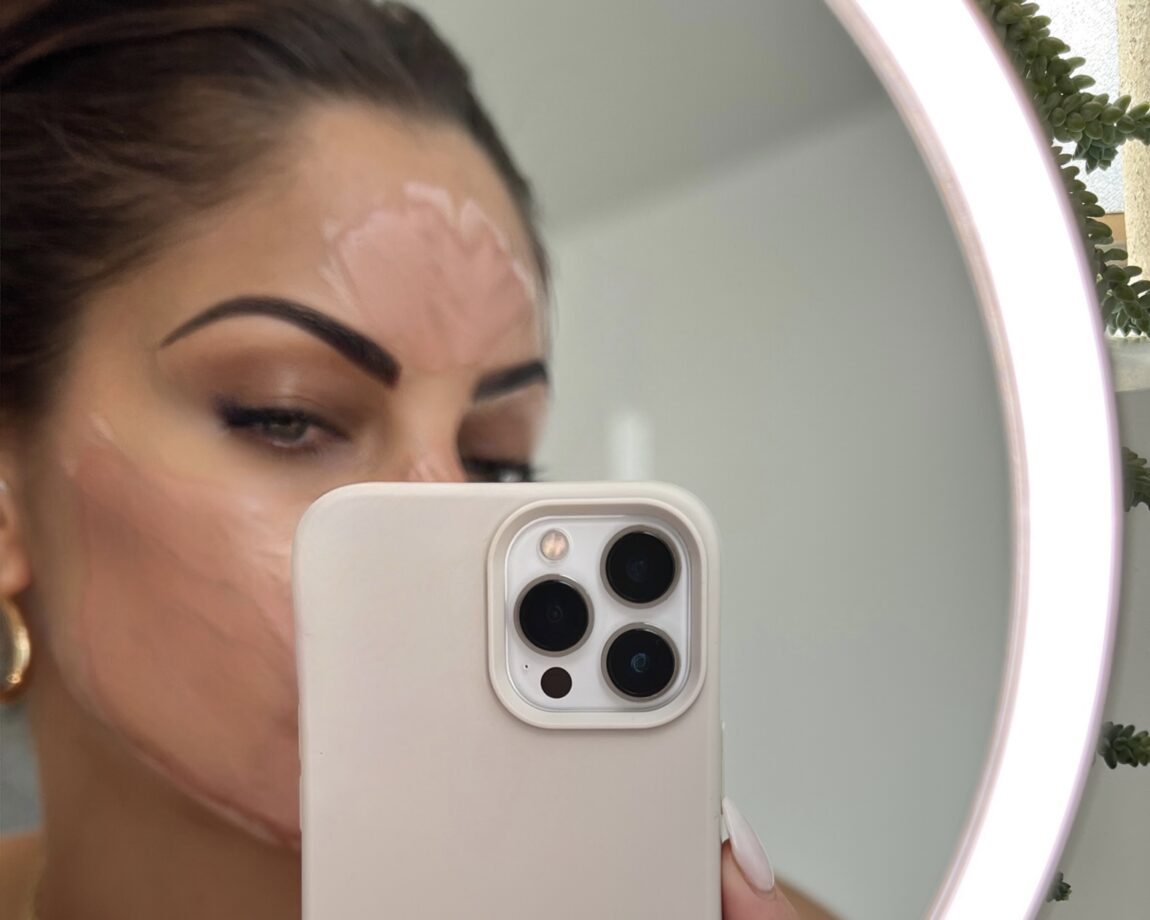
The Perfect Skin Care Routine For Oily Skin
Oily skin is a very common skin concern. Enlarged pores, acne, and blackheads are usually connected with this skin type. Putting together the proper skincare routine to manage these issues is necessary but can feel overwhelming. With thousands of cleansers, serums, face masks, retinols, and moisturizers on the market, it’s hard to know where to begin. And to make things harder, a friend’s holy grail product can be completely ineffective for your particular skin’s needs.
This simple, five-step skincare routine for oily skin can be done both morning and night. And with the help of the right products, you’ll be able to keep your skin healthy and shine-free.
The Step By Step Skincare Routine For Oily Skin
Step 1: Wash Your Face In The Morning And At Night
Washing your face and removing oil, makeup, dirt, and pore-clogging debris should always be the first step in your skin routine. Even though you have oily skin, there’s no need to over-wash your face. Many people believe it’s necessary to use harsh cleansers to dry out their skin. But this will most likely irritate your skin, increasing oil production. Cleansers come in various formulas, like cream, gel, and oils. A gel cleanser is the best option for those with oily or acne-prone skin. They provide the necessary deep cleaning without stripping the skin of all moisture. You should look for a mild or gentle gel cleanser containing salicylic acid to help remove sebum, aka oil, from your pores.
Best Cleansers
- Paula’s Choice RESIST Perfectly Balanced Foaming Cleanser
- Peter Thomas Roth PM Exfoliating Pre-Retinol Prep Cleanser
- Cetaphil Pro Oil Removing Foam Wash
- Kiehl’s Rare Earth Deep Pore Daily Cleanser
Pro Tip. Wash or change your pillowcase at least once a week, if not more. Sweat, dirt, and oil accumulate on your pillowcase each night, and these germs get smooshed into your pores while you sleep, causing further breakouts.

Step 2: Treat Your Skin
Once your skin is freshly cleaned, it’s time to use products that contain ingredients that address your skin’s needs. The products you use in the morning should differ from those in your evening skin routine, as some active ingredients can make your skin sensitive to sunlight.
In the morning, you want to use ingredients that treat your specific skin concerns. Products with niacinamide help absorb the oil on the skin. A water-based Vitamin C serum is a great option, especially if you have acne-prone skin. Its anti-inflammatory properties help reduce pimples and redness on your skin. Glycolic acid is another powerhouse ingredient that helps remove dead skin cells and excess oils from the skin’s surface.
In the evening, it’s best to use products containing retinol or retinoids. Retinol is a holy grail ingredient that every skincare routine should include. It protects against the breakdown of collagen and promotes cell turnover and new collagen production in the skin. These are all great anti-aging benefits, but retinol can also effectively treat acne. It dissolves away dead skin layers, unclogging pores and allowing other acne medications to work more efficiently. Retinols also help fade old acne scars and make your pores look smaller.
If you’re new to using retinol products, it’s best to slowly incorporate it into your nightly skincare routine. This will help reduce the chance of common side effects, which include itchy, dry, and flushed skin. After your skin adjusts to using the product, these side effects fade.

Best Topicals For Day
- Caudalie’s Vinopure Pore Minimizing Serum
- Glycolic Acid 7% Exfoliating Toning Solution
- Paula’s Choice CLINICAL Niacinamide 20% Treatment
Best Topicals For Night
- Differin Gel
- Paula’s Choice CLINICAL 1% Retinol Treatment
- Versed Press Restart Gentle Retinol Serum
- Sunday Riley A+ High-Dose Retinoid Serum
Pro Tip. COSRX Acne Pimple Master Patches are discreet little hydrocolloid patches that help heal pimples by extracting impurities and reducing redness and inflammation.
Step 3: Apply Eye Cream
The skin around the eyes is very thin and more delicate than anywhere else on your face. A lightweight eye serum or cream can provide moisture and address puffiness, dark circles, and fine lines.
- Ren Clean Skin Vita Mineral Active 7 Eye Gel
- Peter Thomas Roth Water Drench Hyaluronic Cloud Hydrating Eye Gel
- Glow Recipe Guava Vitamin C Bright-Eye Gel
- Sunday Riley Auto Correct Brightening + Depuffing Eye Cream for Dark Circles

Step 4: Moisturize
You may think applying a moisturizer is counterintuitive if you have oily skin. But this couldn’t be further from the truth and is a step that should not be overlooked. Oily skin can still become dehydrated, so the trick is using the right moisturizer. You need to use a lightweight, oil-free, water-based moisturizer. Most products formulated for acne-prone skin fit this description.
Best Moisturizers
- Water Drench Hyaluronic Cloud Cream
- Cetaphil Mattifying Acne Moisturizer
- Versed Dew Point Moisturizing Gel Cream
- CeraVe PM Facial Moisturizing Lotion
Step 5: Finish With Sunscreen
Applying sunscreen before doing your makeup in the morning is the final step of your skincare routine. If you are going to be outside during daylight hours, you need to protect your skin. The active ingredients in most skincare products, especially those containing retinol, glycolic acid, salicylic acid, and benzoyl peroxide, make your skin super sensitive to the sun. You will sunburn easily and cause some skin damage. As with your moisturizer, you want to use an oil-free sunscreen that won’t leave your skin feeling greasy.
- EltaMD UV Clear SPF 46 Face Sunscreen
- Supergoop! Unseen Sunscreen SPF 40
- Paula’s Choice RESIST Youth-Extending Daily Hydrating Fluid SPF 50
- Avene Solaire UV Mineral Multi-Defense Sunscreen Fluid SPF 50
Incorporating a clay mask into your skincare routine a few times a week can help to further clarify skin and dry up pore-clogging oils.
- Clinique Acne Solutions™ Oil-Control Cleansing Mask
- Origins Clear Improvement® Active Charcoal Mask to Clear Pores
Other Dos And Don’t For Oily Skin
- Never Skip Post Workout Cleansing
- Avoid Using Alcohol-Based Cleansers
- Avoid Touching Your Face Throughout The Day
- Use Blotting Papers Throughout The Day
- Never Fall Asleep In Your Makeup
The Plus Side Of Oily Skin
Although there are disadvantages to having oily skin, there are also a few advantages. The excess oil helps preserve the skin, and those with oily skin usually have thicker skin and fewer wrinkles than people with other skin types.
Because every person’s skin is unique, there is no one size fits all approach to skincare. If you are still concerned with your skin after trying these over-the-counter skincare products, it may be time to see a board-certified dermatologist. Everyone deserves to feel beautiful in their skin.
If You Found This Helpful, Read These Other Skincare And Beauty Posts!

